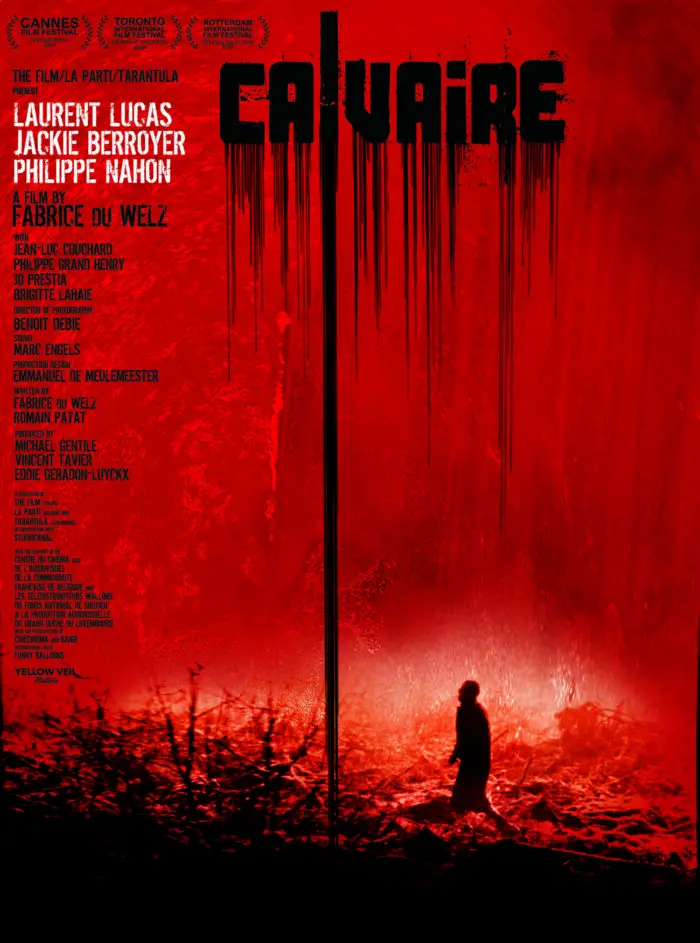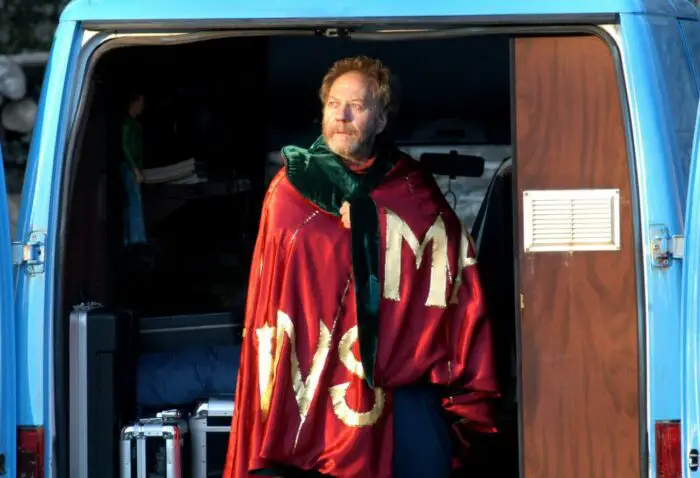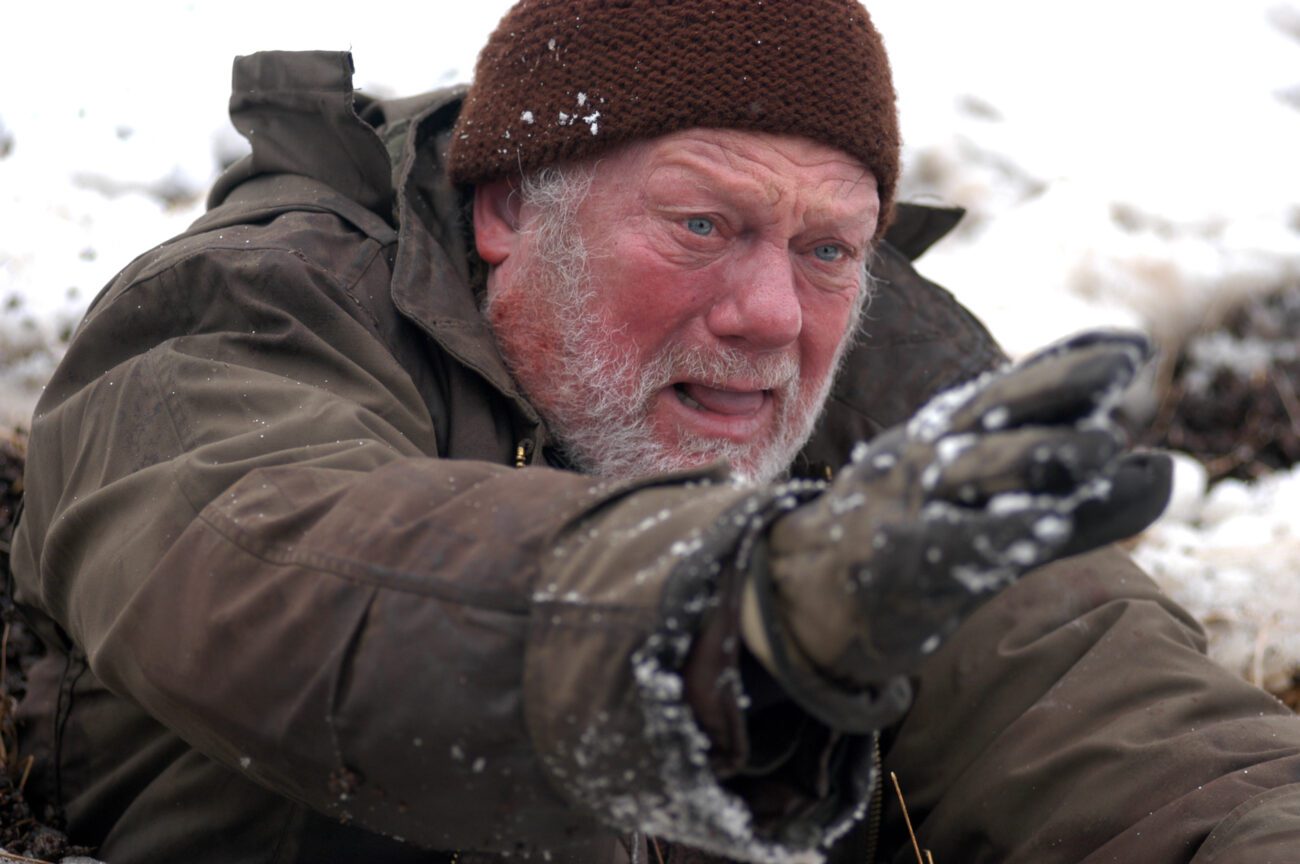There are two paths for movies where an outsider comes to town. Down the first, you’ll see antagonistic villains in the role, as in Needful Things, Halloween, or Fright Night, but down the other path, you have townspeople you’d never want to encounter. Calvaire (The Ordeal) treads this path with magnificent patience, reminding us of the worst humanity has to offer. With the inquisitive pace of The Wicker Man and the gasp-inducing, violent shock of Straw Dogs, mixed with themes of personal possession and identity, Calvaire takes shape.

Calvaire celebrates its nineteenth anniversary this year with a new high-definition remaster treatment. The film would mark the start of Fabrice du Welz’s informal Ardennes trilogy, which continued with 2014 Fantastic Fest Best Picture winner Alleluia, based on the Lonely Hearts Killers, and concludes with 2019’s Adoration where a sheltered boy becomes infatuated with a mentally disturbed teenager. All three films take place on the forest-covered French-Belgian border known as The Ardennes. While Calvaire is considered a Belgian film, it sits in a subgenre known as the New French Extremity movement, a trend of extreme horror films released in France at the start of the millennium, which include films like High Tension, Frontier(s), Inside, and Martyrs.
The story of Calvaire concerns Marc Stevens (Raw’s Laurent Lucas), a traveling performance artist whose tour of old age homes may be a thing of the past as he prepares to head south for a Christmas gala that’s sure to bring stardom. Like Marion Crane in Psycho, inclement weather causes Marc to deviate from the main road but finds a hidden inn to take refuge. Before arriving, his car stalls out, effectively keeping him in the middle of nowhere. The innkeeper, Bartel (Jackie Berroyer), has his quirks, but he’s accommodating, even offering to fix Marc’s van. However, there’s a strange atmospheric change when Marc is told to avoid the town.
Fabrice du Welz engages the audience with his oddball character setups, like the polarizing opposition of Marc and Bartel. Though Bartel presents himself the same as Marc as a former entertainer, he’s also a lonely man thankful for the attention that comes with Marc’s company. The sentiment isn’t reciprocated, and it isn’t until Welz shows Bartel without Marc that the audience witnesses something more nefarious being plotted. Revealing Bartel’s backstory of being jilted by his enormously talented singer-wife, a psychological transference develops where Bartel intends to keep Marc as his replacement wife.

Similarly, Boris’ (Jean-Luc Couchard) detached presence generates general amusement while he painstakingly walks the woods over and over to find his lost dog. Empathetically, the audience will see the character as benign at first. He helps Marc get to the inn but shushes Marc consistently along the way as he attempts to listen for the dog. It’s a quirky character trait that aligns with the weird behavior we’d see in the small-town eccentricity of a place like Twin Peaks. This reference seems to resurface when the entirely male-populated pub bursts into song and dance. However, the silencing action is also dismissive, expecting Marc’s subservience. By the end of the film, the audience will wonder if the “lost dog” was ever really a dog at all because it seems anything may fit the description if Boris wants it to.
With Bartel’s ominous warning, we’re initially inclined to trust Bartel’s advice. When Marc hears a commotion in a nearby barn, what he witnesses is appalling and confirms Bartel’s advice. Yet, the lesser of two evils rule seems to come into play, driving the audience to root for the townspeople when Marc becomes the subject of brutal violence and abject torture. Any relief is brief, however, as Marc’s saviors reveal themselves to be more sadistic.
Calvaire is like watching a spiraling nightmare play out. Starting methodically with themes of possession from the staff and residents of Marc’s last gig. It strips away grounded reality, replacing it with a Dante-like journey into hell. Beginning with the off-putting incidents at the old age home, Marc’s alluring talent is demonized by almost giving others the right to fixate on and sexualize him. Like a siren, there’s no doubt that Marc has a sort of magnetism to those that hear him sing, but the advances go unwanted. The parallel between the incident and what occurs with the townspeople is seen in Marc’s rejection of the ladies and the inference that he’s leaving them to pursue bigger and better things. Bartel’s wife Gloria did the same, though she seemed to take the hearts of many men with her. Marc serves as her symbolic replacement, Bartel even dressing him as such, considering Marc a reincarnation of sorts that incurs the wrath of Gloria’s dismissal and abandonment.

Watching du Welz’s tale of heartache and celebrity, I couldn’t stop thinking of the Bob Dylan song “It’s All Over Now Baby Blue,” specifically in its relation to the Joyce Carol Oates’ story Where Are You Going, Where Have You Been? that it inspired. Particularly the line in the song, “The vagabond who’s rapping at your door/is standing in the clothes that you once wore.” In Oates’ story, Arnold Friend is a stand-in for Dylan, written to project his perception as godly to his ’60s admirers. The Oates’ story also ends with the villain mentioning the young protagonist’s blue eyes, even though she has Brown eyes, making her a stand-in for who Arnold means to cause harm.
Fans of the New French Extremity movement will ultimately find Calvaire on the lighter side of the subgenre versus some of the aforementioned titles, but that doesn’t mean it doesn’t belong. When the townspeople descend on Bartel’s home, we see some incredibly gory practical effects moments as well as some equally hand-over-mouth inciting scenes caused by the disturbing events. Still, Calvaire is a gripping experience that horror fans have delighted in since the movie first premiered at the Cannes Film Festival, and I can now put myself on that list as well. If you like your extreme horror with a psychological impetus, Calvaire will satiate your bloodlust and need for structural motivation. If you prefer more slasher-type extremes like Saw and Hostel, Calvaire will comparatively seem like an elevated film.
Calvaire returns to theaters on February 24, just ahead of its digital release on March 3.



